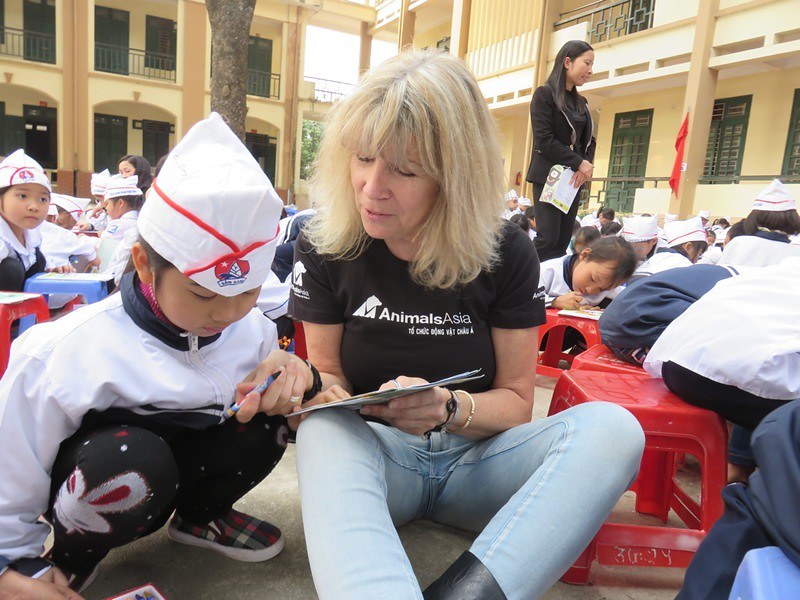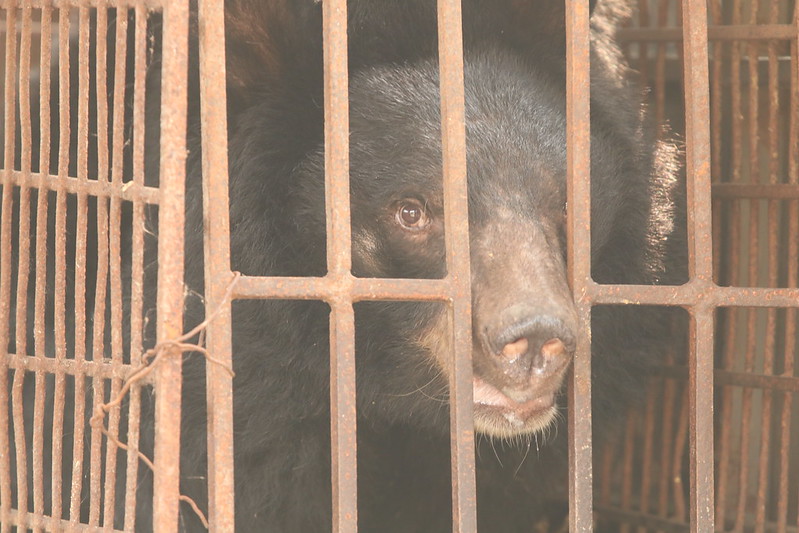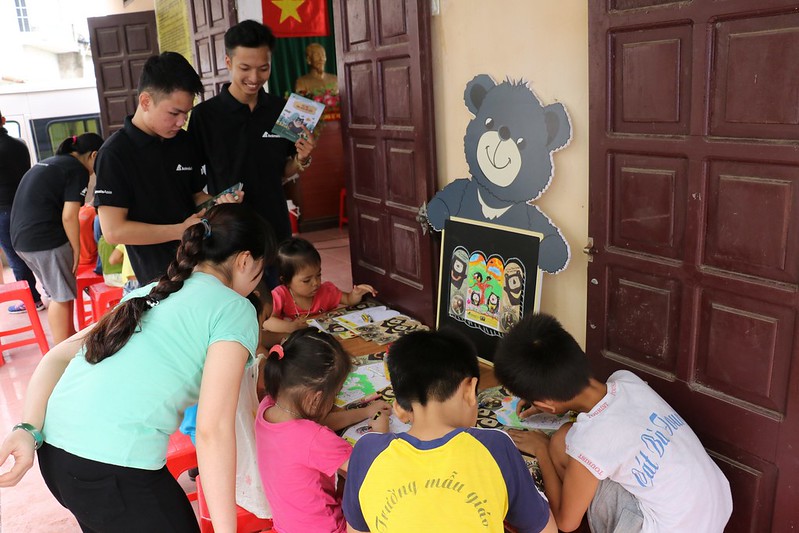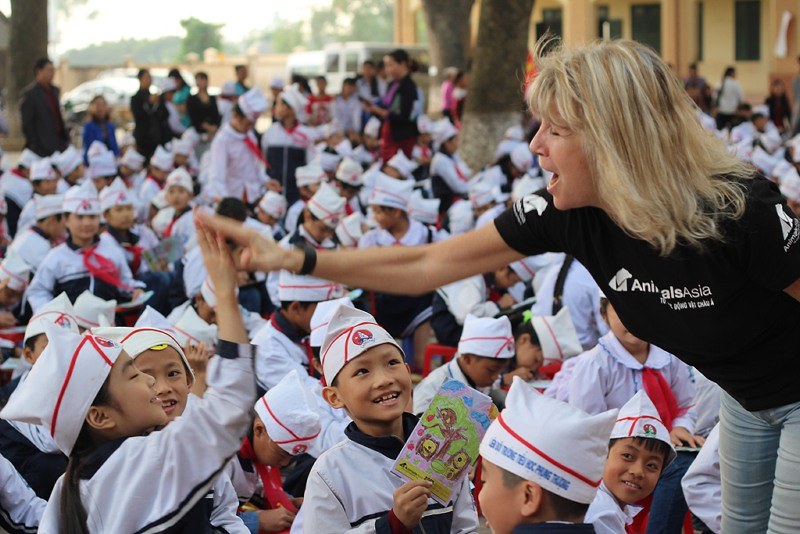Convincing Vietnam’s most notorious bile farm village that now is the time for change
19 April 2019
Bear bile farming is entrenched in Phung Thuong village but consistent outreach over years has convinced the first farmer to give up their bear.
Many of the villages dotted around Vietnam’s capital are intrinsically linked with trades and industries which have come to define them.
There is the ceramic pottery village of Bat Trang where plant pots, bowls, cups and saucers of all shapes and sizes are piled high in the streets.
There is the village of Cu Da where rice noodles hang drying in the sun from every balcony and jostle for light in every alley like hungry sunflowers.
In Dong Ky village the majority of households specialise in delicate wood carvings, while in Phu Vinh generations of weavers create beautiful rattan and bamboo bags, furniture and handicrafts of all shapes and sizes.
And then there is Phung Thuong village, the tiny hamlet – a little more than six square kilometres – which has become synonymous with the illegal and brutal bear bile industry.
Here 164 moon bears have been kept in tiny cages for decades suffering regular bile extraction for use in traditional medicine.
Nearly 25% of all captive bears in Vietnam are kept in this one village, the last bear bile farming hotspot left in a country which has resolved to shut the industry down forever.
Since 2016, Animals Asia has been working to gain the trust of the villagers and to convince them to end the industry humanely by allowing their bears to be rescued and sent to dedicated sanctuaries.
To this end, free traditional medicine clinics have been offered every other month to spread the word about herbal alternatives to bear bile among the older generations.
The neighborhood primary school, where many of the children of bear bile farmers are educated, has become a local symbol of bear protection. The school children have planted gardens of herbal alternatives to bear bile while the local government asked Animals Asia to paint murals of happy bears living in their natural habitat on the school’s outer walls.
Bear bile farmers themselves were invited to a conference on bear care where they were shown exactly how Animals Asia cares for rescued bears at its sanctuary, giving them a glimpse of a more compassionate future for their bears.
All these activities, carried out consistently over three years resulted in the momentous rescue of moon bear Amy in April 2019.
This was the first time any of the bile farmers had allowed one of their bears to be rescued. Up to this point, all the farmers had been encouraged to present a united front against perceived attacks on their livelihood from outsiders.
In a tiny village where everybody knows everyone else, nobody wanted to be the first to break ranks and abandon the dying industry even though the writing was literally on the wall.
Now, finally, the united front has cracked and it is hoped many more farmers will feel emboldened to come forward and accept the help being genuinely offered to do what is right by the animals under their care.
Animals Asia Vietnam Director Tuan Bendixsen said:
“The rescue of Amy was vitally important for the campaign to end bear bile farming in Vietnam. It proved that bear bile farmers want out; that many of them – under pressure from the government, their children and the public – no longer want to be associated with a cruel and illegal industry.
“After years of outreach, I think we are accepted by large parts of the village community now. The older generation are coming to our health checks, we’re a valued part of school life and local government is approaching us to work with them.
“Most importantly, I’ve noticed that local people are no longer afraid to speak out. We hear people publicly saying that the bears should be given up. They aren’t afraid to be overheard by bile industry families or their relatives. It’s now acceptable to voice opposition to what was once the main economic driver in the village. And that’s all a result of sustained, dedicated outreach.”
The breakthrough of Amy’s rescue is hugely important, but it doesn’t mean the trust-building and outreach work will end.
Tuan said:
“We’re not here to rescue just one bear, we’re here to rescue them all. The health clinics will continue, the gardens of herbal alternatives will be maintained, and we’ll expand the programme.”
Already, Animals Asia has been approached by the village’s new primary school to work with them, while an awareness-raising event – the football Bear Cup – will be added to the calendar.
Tuan said:
“Many farmers and their families are tired of bear bile farming. They see the immorality of keeping bears in such terrible conditions and are ready to give it up. But there are still those who are determined to hold on.
“Convincing every farmer will take time but a great many people are on our side now. Every day the forest rangers are talking to farmers, convincing them to do the right thing. The local authorities are doing the same and all over town villagers can see posters explaining that bear bile farming is cruel and illegal.
“There is a lot of goodwill there now that has to be capitalised on. Now is not the time to congratulate ourselves on one rescue. It’s time to keep the focus on getting all the bears to safety as soon as possible.”
READ MORE:
Explained: The roadmap to ending bear bile farming in Vietnam
Delight as first bear is secretly rescued from Vietnam’s last bile farm hotspot
Reducing demand for bear bile: “Mum, you’ll never guess what I learned in school today”
BACK









